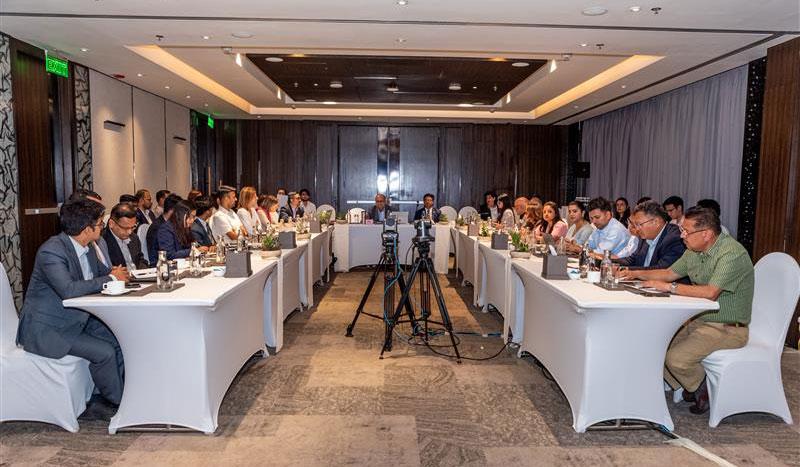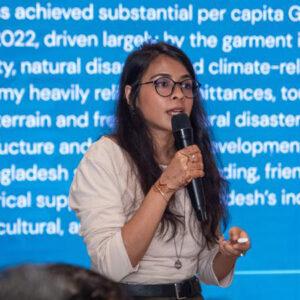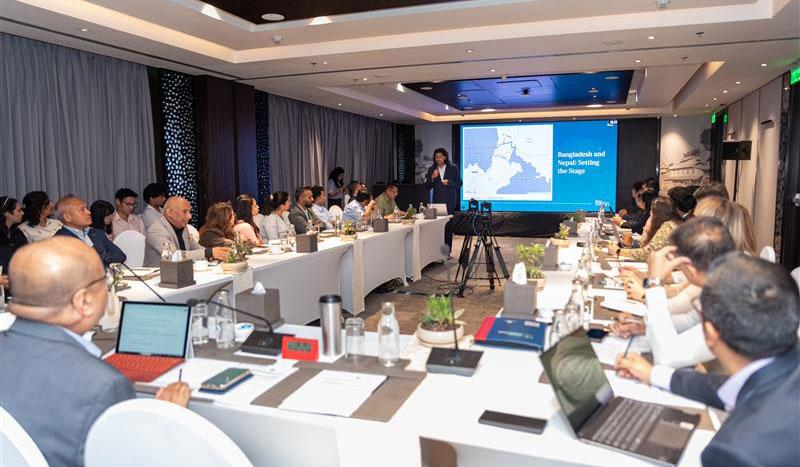
On 13 June 2025, the Bangladesh–Nepal Roundtable Dialogue took place in Kathmandu as part of a joint initiative by the Nepal Economic Forum (NEF) and the Centre for Policy Dialogue (CPD) in Bangladesh. The event gathered key stakeholders from the government, private sector, and academia to reflect on the evolving landscape of bilateral cooperation. The dialogue included two core presentations, each providing a distinct perspective on how the Bangladesh–Nepal relationship can be strengthened in the years to come.

Ms Afrin Mahbub spoke about the evolving Bangladesh–Nepal economic cooperation with a strong focus on investment and regional value chain integration. While trade volumes between the two countries have fluctuated, investment has remained limited. Nepal’s FDI inflow to Bangladesh, though historically negligible, has shown a recent upward trend, with a notable increase in the fiscal year 2021. Bangladesh offers an attractive investment environment, featuring fiscal incentives, tax holidays, export subsidies, and full repatriation of capital and profits, particularly in its Economic Zones and Export Processing Zones. However, cross-border investment still faces challenges, including high transaction costs and lengthy procedures. Ms Mahbub also emphasised the importance of regional value chains in boosting industrial diversification, enhancing export competitiveness, and facilitating smoother LDC graduation for both countries. Bangladesh’s backward linkages remain modest, whereas Nepal demonstrates strong backward and forward integration into global value chains. Leveraging geographic proximity, upgrading infrastructure, harmonising industrial policies, and establishing efficient regional trade agreements with streamlined border procedures were emphasised as critical steps towards fostering deeper value chain participation and attracting more sustainable cross-border investments.

As part of the Nepal and the World (NAW) initiative under NEF’s foreign policy and incubation centre, Mr Aman Pant provided a strategic overview of Bangladesh–Nepal relations, highlighting shared regional affiliations through platforms such as the South Asian Association for Regional Cooperation (SAARC), the Bay of Bengal Initiative for Multi-Sectoral Technical and Economic Cooperation (BIMSTEC), Bangladesh, Bhutan, India, Nepal (BBIN), and the South Asia Subregional Economic Cooperation (SASEC). He outlined the historical foundations of cooperation, including the 1976 Trade and Transit Agreements, the 1978 Joint Economic Commission, and the 2019 Double Taxation Avoidance Agreement. He emphasised the need to expand beyond current low trade volumes by leveraging mutual export potential in sectors such as textiles, agro-products, spices, and IT services. Additionally, he identified energy trade, tourism, and education as strategic avenues for deeper ties, noting that Bangladesh has become Nepal’s fifth-largest source of tourism, with over 48,000 visitors in 2024, and that there has been substantial growth in Nepali student enrollment in Bangladeshi medical institutions. He concluded with a forward-looking roadmap featuring multi-stakeholder dialogues, policy alignment efforts, youth engagement, and digital connectivity initiatives, paving the way for sustained institutional collaboration and regional integration.

The roundtable discussions underscored tourism as a vital means of enhancing people-to-people connectivity between Bangladesh and Nepal, with thousands of Bangladeshi tourists visiting Nepal each year. Additionally, numerous Nepali students travel to Bangladesh to pursue their medical education. Simultaneously, Bangladeshi students may also study hospitality in Nepal, creating opportunities for mutually beneficial academic exchange between the two countries. Participants emphasised the necessity of improving air and land connectivity, streamlining logistics, and eliminating procedural bottlenecks to unlock the untapped potential in bilateral trade. Nepal could export cardamom, tea, fast-moving consumer goods (FMCG), and agricultural products to Bangladesh, while importing more apparel and manufactured goods from Bangladesh, thereby reducing reliance on India and China. However, persistent logistical challenges, including costly maritime insurance, fees to the Nepal Transit and Warehousing Company (NTWC), double testing of goods, foreign exchange and letter of credit barriers, and slow paperwork, continue to impede trade flows, especially for small and medium-sized enterprises (SMEs). The absence of bilateral protocols, such as for seed trade, and dependency on Indian transit routes further exacerbate delays and costs. Emphasis was placed on the need to rethink negotiation strategies and involve a broader range of stakeholders, including supply chain agents. Non-tariff measures (NTMs), more than tariffs, emerged as the principal barrier to trade, given their unpredictability and administrative burden. Participants also noted that while Bangladesh and Nepal are geographically close, power and energy cooperation remains constrained by infrastructural limitations, including high transmission losses in Bangladesh’s south–north corridor, making north-based power trade with Nepal and Bhutan more viable. The overarching message emphasised the importance of effective planning, streamlined protocols, and inclusive stakeholder engagement, all of which were presented as critical to transforming trade ties between Bangladesh and Nepal.


